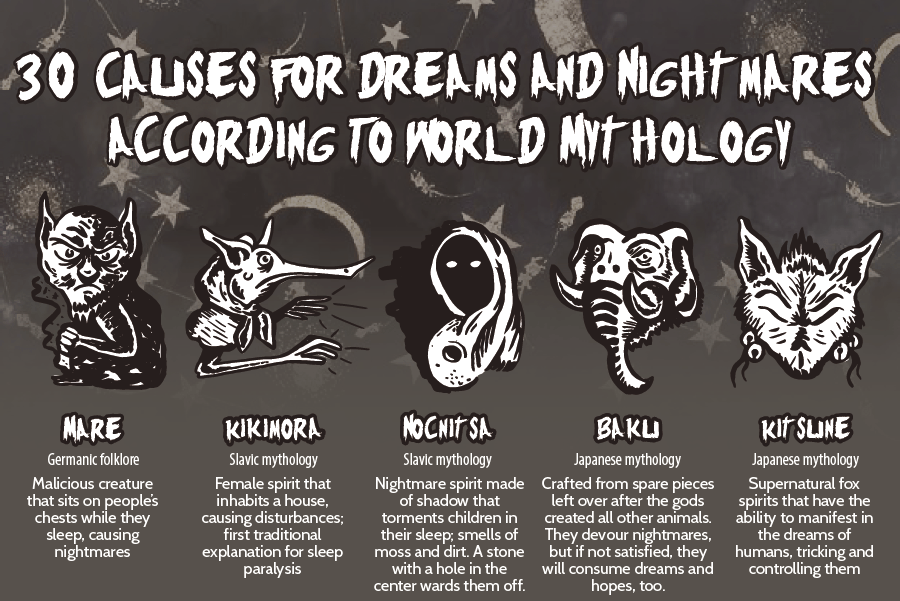
Waking in a panic with a pounding heart and racing mind is a familiar experience for anyone who’s had a nightmare. More intense and vivid than typical dreams, nightmares can seem all too real while invoking strong negative emotions such as anger, fear, sadness, anxiety, and guilt. If they happen often, you can easily develop extreme anxiety around falling asleep.
Psychologists have long thought that nightmares are caused by current emotional distress or as a side effect of trauma. (1) Factors such as stress, distressing experiences, and life’s upheavals are all thought to fuel nightmares. However, a recent study suggests that long-term personality traits rather than temporary emotional states have more impact on the frequency of nightmares and how distressing they feel.
The Study
The study, published in Dreaming, found that how a person’s mind is structured and their ability to control emotional reactions are critical factors in the occurrence and impact of nightmares. (2)
Previous studies have looked at how often people have nightmares and how much they disturb them. However, there has been an ongoing debate about whether long-term personality traits or temporary experiences cause nightmares. The researchers wanted to explain how these factors work together, especially traits like ego strength — the ability to cope with stress and adversity — and emotional regulation, which is how capable you are of controlling your emotional state.
They found that low ego strength and high emotional dysregulation are linked to feeling more distress from nightmares. In other words, people who struggle to manage stress and maintain psychological stability are more affected by their nightmares and tend to have them more often.
The Relationship Between Nightmares and Mental Health
Nightmares may reflect unconscious fears the brain uses to make sense of the world. They may also be an attempt to protect against threats to survival, which humans are instinctively wired to prioritize, explains licensed psychologist Dr. Kristen Wheldon, founder of the Fire Service Psychology Association. Likewise, emotions stem from the fight-or-flight response tied to survival instincts.
Previous studies have led experts to believe that poor mental health can worsen nightmares. However, the Dreaming study suggests that personality traits linked to an inability to cope with and control stressful emotions may make people susceptible to both mental health issues and nightmare disorders.
This may suggest that people who have more difficulty processing and managing stressful or traumatic events end up repressing them, leaving their brains to work hard to piece the puzzle together during sleep.
How Personality Can Impact Dreams
According to Dr. Deborah Gilman, owner and Chief Licensed Psychologist at Fox Chapel Psychological Services, certain personality traits are associated with a tendency to experience positive or negative emotions in dreams. “Personalities influence the type of information being consolidated, which then influences the affective nature of dreams,” she explains.
During dreams, your brain sorts through feelings and experiences from the day, which Dr. Gilman compares to organizing a messy room. This process helps us make sense of our emotions and can even reduce stress. But if a higher portion of your thoughts are negative, your dreams will likely reflect this.
One of the most widely studied dream content models is The Continuity Hypothesis of dreaming, which suggests that dreams generally align with current thoughts, concerns, and experiences. Dr. Gilman explains that people with personality traits that increase a tendency toward negative emotions will be more likely to carry those emotions into their dreams.
For instance, people with neuroticism often have more frequent and intense nightmares or dreams filled with anxiety, fear, and sadness, she says, while those who are naturally more anxious or sensitive can have dreams akin to horror movies.
Negative Effects of Nightmares
“These dreams tend to be remembered more because the content is more disturbing and upsetting — this might impact decision-making or emotional responses in waking life,” says Dr. Gilman.
Research shows recurring nightmares are associated with poor concentration and daytime functioning, anxiety, self-harm, and suicidal behaviors, and there is a strong link between nightmares and depression. (3)
According to Dr. Wheldon, trauma is processed during sleep in REM stages, and nightmares disrupt this natural process. Lack of REM sleep, the most restorative part, can lead to feelings of grogginess, tiredness, and lack of concentration in the short term.
Chronically, it can lead to psychological disturbances like anxiety, erratic mood swings, low concentration, and mild hallucinations. (4) Even if you get enough hours of sleep, you won’t feel refreshed in the morning if your REM sleep is interrupted.
Use Mindfulness to Combat Difficult Emotions and Dreams
While personality traits may be long-lasting, they are changeable. Therapy and mindfulness tools can help manage stress and increase emotional regulation, both factors that influence the intensity and frequency of nightmares, according to the Dreaming study.
Dr. Gilman suggests keeping a dream journal as a helpful way to manage negative emotions. By comparing dream scenarios with real-life situations, you can understand how your unconscious mind affects your thoughts, feelings, and actions. “It offers a window into the subconscious and a means to unravel anxieties that may lurk beneath the surface of waking life,” she says.
According to Jessica Plonchak, LCSW, Executive Clinical Director at ChoicePoint, understanding and controlling stress is critical. “Stress hormones such as cortisol can keep your body on high alert, making it difficult to relax and fall asleep,” she says.
She recommends regular talk therapy or EMDR (eye movement desensitization and reprocessing) and good sleep habits, such as maintaining a regular sleep schedule and following a calming nighttime routine. She also suggests paying attention to how dietary habits and changes affect sleep and taking magnesium to help improve sleep quality.
“If self-help methods seem ineffective at any point, consult your doctor,” says Plonchak.

30 Causes of Dreams and Nightmares (According to World Mythology)

A Guide to Dream Interpretation

The Ultimate Guide to Different Parasomnias

How To Keep A Dream Journal: Tips and Benefits
Sources
1. Campbell, R.L., Germain, A. Nightmares and Posttraumatic Stress Disorder (PTSD). Curr Sleep Medicine Rep 2, 74–80 (2016). https://doi.org/10.1007/s40675-016-0037-0
2. Kelly, W. E., & Mathe, J. R. (2024). Revisiting trait and state predictors of nightmare frequency and nightmare distress. Dreaming. Advance online publication. https://doi.org/10.1037/drm0000266
3. Wang, C., Xu, J., Wang, M., Shao, X., & Wang, W. (2021). Prevalence and Detailed Experience of Nightmare and Nightmare Disorder in Chinese University Students. Sage Open, 11(2). https://doi.org/10.1177/21582440211014193
4. Bruce Morden, George Mitchell, William Dement,
Selective REM sleep deprivation and compensation phenomena in the rat, Brain Research, Volume 5, Issue 3, 1967, Pages 339-349, ISSN 0006-8993, https://doi.org/10.1016/0006-8993(67)90042-X.
Wheldon, Kristen. Author interview. May 2024.
Gilman, Deborah. Author interview. May 2024.
Plonchak, Jessica. Author interview. May 2024.
